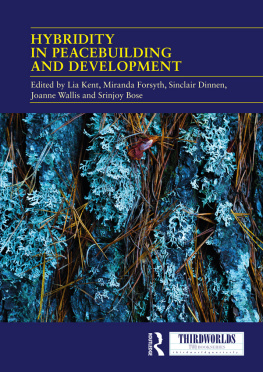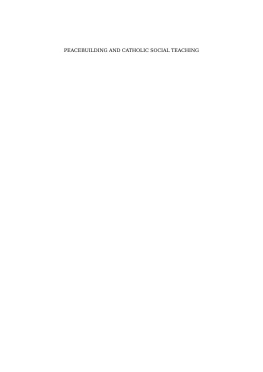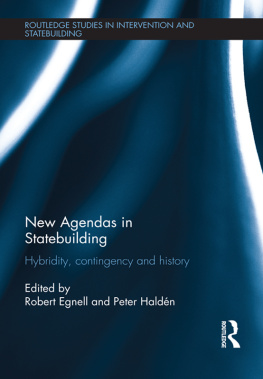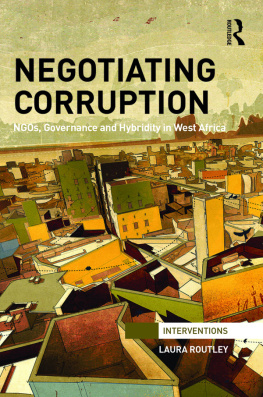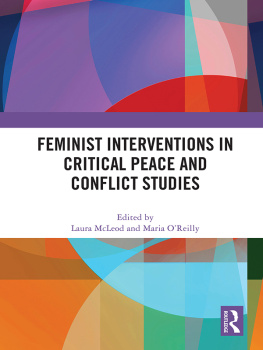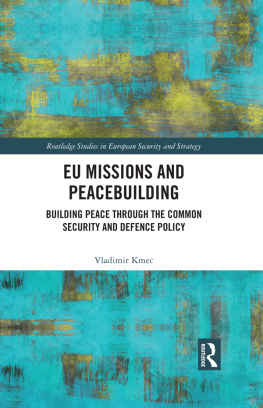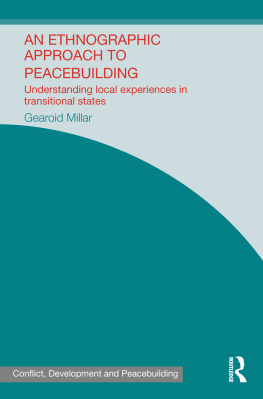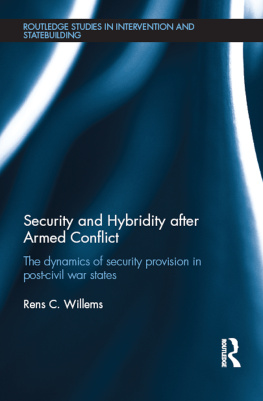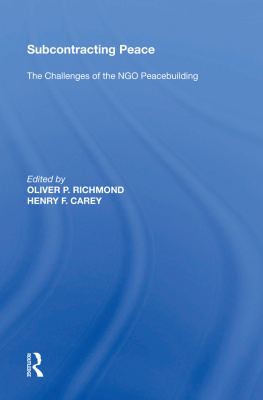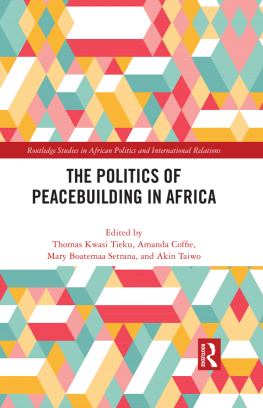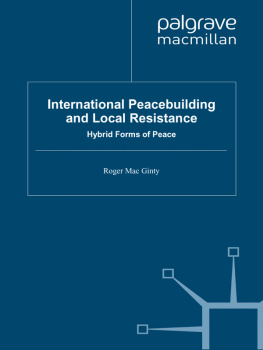Hybridity in Peacebuilding and Development
The concept of hybridity highlights complex processes of interaction and transformation between different institutional and social forms, and normative systems. It has been used in numerous ways to generate important analytical and methodological insights into peace-building and development. Its most recent application in the social sciences has also attracted powerful critiques that have highlighted its limitations and challenged its continuing usage.
This book examines whether the value of hybridity as a concept can continue to be harnessed, and how its shortcomings might be mitigated or overcome. It does so in an interdisciplinary way, as hybridity has been used as a benchmark across multiple disciplines and areas of practical engagement over the past decade including peacebuilding, state-building, justice reform, security, development studies, anthropology, and economics. This book encourages a dialogue about the uses and critiques of hybridity from a variety of perspectives and vantage points, including deeply ethnographic works, high-level theory, and applied policy work. The authors conclude that there is continued value in the concept of hybridity, but argue that this value can only be realised if the concept is engaged with in a reflexive and critical way.
This book was originally published as a special issue of the online journal Third World Thematics.
Lia Kent is a Fellow in the School of Regulation and Global Governance at The Australian National University. Her research is concerned with questions of peacebuilding, transitional justice, memory and reconciliation, with a geographic focus on Timor-Leste and Aceh.
Miranda Forsyth is an Associate Professor in the School of Regulation and Global Governance at The Australian National University. She formerly lectured in criminal law at the University of the South Pacific. Her research focuses on the possibilities and challenges of the inter operation of state and non-state justice and regulatory systems.
Sinclair Dinnen is an Associate Professor with the Department of Pacific Affairs at The Australian National University. He has a background in socio-legal studies and criminology. His research examines issues of regulatory pluralism, security governance, and politics and state formation in postcolonial societies, with a particular focus on the independent Melanesian countries in the southwest Pacific.
Joanne Wallis is a Senior Lecturer in the Strategic and Defence Studies Centre, Coral Bell School of Asia Pacific Affairs, at The Australian National University. Her research focuses on peacebuilding and security in the Pacific islands, with a special focus on Timor-Leste and Bougainville, Papua New Guinea.
Srinjoy Bose is a Lecturer in the School of Social Sciences at the University of New South Wales, Australia. He was formerly European Union COFUND (Marie Sklodowska-Curie Action) Fellow in the School of Government and International Affairs at Durham University, UK. His research is at the intersection of peace/security/conflict and development.
ThirdWorlds
Edited by Shahid Qadir, University of London, UK
ThirdWorlds will focus on the political economy, development and cultures of those parts of the world that have experienced the most political, social, and economic upheaval, and which have faced the greatest challenges of the postcolonial world under globalisation: poverty, displacement and diaspora, environmental degradation, human and civil rights abuses, war, hunger, and disease.
ThirdWorlds serves as a signifier of oppositional emerging economies and cultures ranging from Africa, Asia, Latin America, Middle East, and even those Souths within a larger perceived North, such as the U.S. South and Mediterranean Europe. The study of these otherwise disparate and discontinuous areas, known collectively as the Global South, demonstrates that as globalisation pervades the planet, the south, as a synonym for sub alterity, also transcends geographical and ideological frontier.
Corruption in the Aftermath of War
Edited by Jonas Lindberg and
Camilla Orjuela
Everyday Energy Politics in Central Asia and the Caucasus
Citizens Needs, Entitlements and Struggles for Access
Edited by David Gullette and Jeanne Faux de la Croix
The UN and the Global South, 1945 and 2015
Edited by Thomas G. Weiss and Pallavi Roy
The Green Economy in the Global South
Edited by Stefano Ponte and Daniel Brockington
Food Sovereignty
Convergence and Contradictions, Condition and Challenges
Edited by Eric Holt-Gimnez, Alberto Alonso-Fradejas, Todd Holmes and Martha Jane Robbins
The International Politics of Ebola
Edited by Anne Roemer-Mahler and Simon Rushton
Rising Powers and South-South Cooperation
Edited by Kevin Gray and Barry K. Gills
The Local Turn in Peacebuilding
The Liberal Peace Challenged
Edited by Joakim jendal, Isabell Schierenbeck and Caroline Hughes
Chinas Contingencies and Globalization
Edited by Changgang Guo, Liu Debin and Jan Nederveen Pieterse
The Power of Human Rights/The Human Rights of Power
Edited by Louiza Odysseos and Anna Selmeczi
Class Dynamics of Development
Edited by Jonathan Pattenden, Liam Campling, Satoshi Miyamura and Benjamin Selwyn
Third World Approaches to International Law
Edited by Amar Bhatia, Usha Natarajan, John Reynolds and Sujith Xavier
Fragility, Aid, and State-building
Understanding Diverse Trajectories
Edited by Rachel M. Gisselquist
Rural Transformations and Agro-Food Systems
The BRICS and Agrarian Change in the Global South
Edited by Ben M. McKay, Ruth Hall and Juan Liu
Sustainable Development in Africa-EU relations
Edited by Mark Langan and Sophia Price
New Mechanisms of Participation in Extractive Governance
Between Technologies of Governance and Resistance Work
Edited by Esben Leifsen, Maria-Therese Gustafsson, Mara Antonieta Guzmn-Gallegos and Almut Schilling-Vacaflor
The Development Dictionary @25
Post-Development and its Consequences
Edited by Aram Ziai
Power and Illicit Drugs in the Global South
Edited by Maziyar Ghiabi
Hybridity in Peacebuilding and Development
A Critical and Reflexive Approach
Edited by Lia Kent, Miranda Forsyth, Sinclair Dinnen, Joanne Wallis and Srinjoy Bose
The Agency of the Governed in the Global South
Normative and Institutional Change
Edited by Anke Draude
Innovations in Sport for Development and Peace Research
Edited by Megan Chawansky, Lyndsay M. C. Hayhurst, Mary G. McDonald and Cathy van Ingen
For more information about this series, please visit: https://www.routledge.com/series/TWQ

